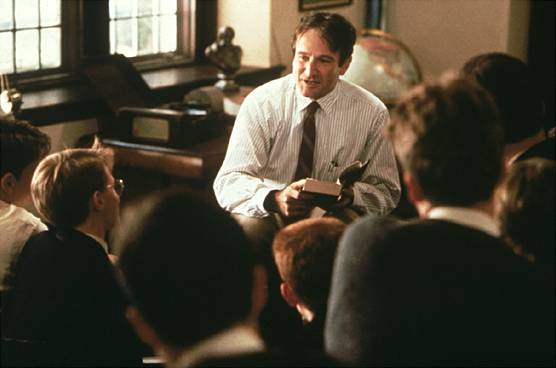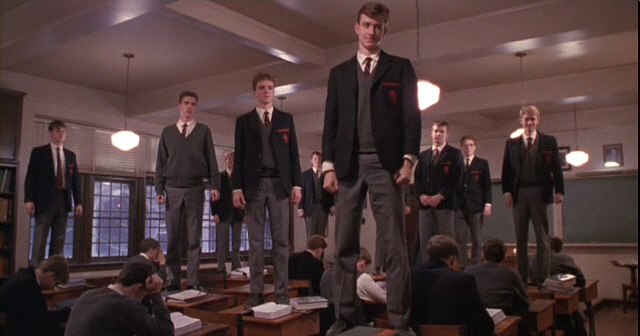
From the moment we see the schoolboys of Welton Academy transforming the tenets of their prep school; "tradition, honor, discipline, and excellence," into the eminently more playful "travesty, horror, decadence, and excrement," we know they're not waiting for Superman; they're waiting for Robin Williams, or rather John Keating, the unorthodox, visionary teacher Williams plays in Peter Weir's Dead Poets Society (1989). Keating reminds us what the best kinds of teachers do for their students.
1) Make language and knowledge sexy:
Keating is the stick-up-the-bum headmaster's worst nightmare and the repressed schoolboys' greatest fantasy, second only to the towheaded cheerleaders they chase throughout the film. He gives life to words and ideas, using vivid language to make his students actually feel something and act on it. After one of his pupils (Gale Hansen) reads a poem he has copied onto the back of a centerfold, we finally get it. Keating is the kind of teacher who can make the side of the pin-up with the poem more exciting to an adolescent boy than the one with the comely lass.
2) Make yourself and the material accessible and relevant to them:
When Keating does his impression of Julius Caesar à la Marlon Brando, he carries Shakespeare off his pedestal and gives him back to the students. "Friends, Romans, and countrymen," he grunts, Brandoesque, and the boys laugh and laugh. Shakespeare is finally one of them. More powerful still, Keating shares himself just as readily. To these schoolboys, he seems to be everywhere at once -- beckoning to them, asking them to huddle up for secrets, inserting himself directly into their intellectual lives and inviting them into his.
3) Push them to think beyond the classroom:
From the moment Keating pokes his playful face around the corner of the classroom, strolls through whistling, and beckons the boys to leave it, he dares them to transcend the boundaries of the room itself and what it stands for: tradition and conformity. He drives them to acts of creative whimsy, such as tearing circumscribed descriptions of poetry from textbooks with wild abandonment, and beating drums, donning lipstick war paint, and reading poetry in caves. Indeed, just as Keating promises, around him, "spirits soared, women swooned and gods were created."
4) Teach them to see the world in a different way:
When Keating has his pupils stand on desks to see things from another perspective, he gives them a new world. He touches previously uncaressed places in their minds, spaces once free of the tickle of thought or reflection. He turns a whole class of pimple-faced, doctors, lawyers, and businessmen-to-be so high on hormones they can barely see straight into the unspeakable -- poets and free thinkers.
5) Draw something out of them that they didn't even know they had inside:
Keating is even the kind of educator who can coax from a shy, stuttering student (Ethan Hawke) Walt Whitman's famed "barbaric yawp." Hopefully, we've all had teachers like this. One of my professors in graduate school actually inspired our whole class to get up on our desks at the end of the semester and chant (you guessed it), "O Captain! My Captain!" She was our Keating, our fearless leader who asked us not merely to write poetry, but to add our very own line to the larger poem of life.
